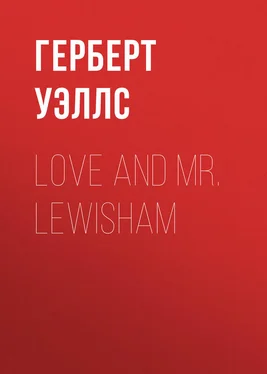Герберт Уэллс - Love and Mr. Lewisham
Здесь есть возможность читать онлайн «Герберт Уэллс - Love and Mr. Lewisham» — ознакомительный отрывок электронной книги совершенно бесплатно, а после прочтения отрывка купить полную версию. В некоторых случаях можно слушать аудио, скачать через торрент в формате fb2 и присутствует краткое содержание. Жанр: Юмористические книги, foreign_prose, Зарубежные любовные романы, на английском языке. Описание произведения, (предисловие) а так же отзывы посетителей доступны на портале библиотеки ЛибКат.
- Название:Love and Mr. Lewisham
- Автор:
- Жанр:
- Год:неизвестен
- ISBN:нет данных
- Рейтинг книги:4 / 5. Голосов: 1
-
Избранное:Добавить в избранное
- Отзывы:
-
Ваша оценка:
- 80
- 1
- 2
- 3
- 4
- 5
Love and Mr. Lewisham: краткое содержание, описание и аннотация
Предлагаем к чтению аннотацию, описание, краткое содержание или предисловие (зависит от того, что написал сам автор книги «Love and Mr. Lewisham»). Если вы не нашли необходимую информацию о книге — напишите в комментариях, мы постараемся отыскать её.
Love and Mr. Lewisham — читать онлайн ознакомительный отрывок
Ниже представлен текст книги, разбитый по страницам. Система сохранения места последней прочитанной страницы, позволяет с удобством читать онлайн бесплатно книгу «Love and Mr. Lewisham», без необходимости каждый раз заново искать на чём Вы остановились. Поставьте закладку, и сможете в любой момент перейти на страницу, на которой закончили чтение.
Интервал:
Закладка:
In the blackness of the shed he worked himself up to the pitch of talking as if she were present. And he said some fine brave things.
He found the little old lady of the wallflowers with a candle in her window, and drank a bottle of ginger beer with a sacramental air. The little old lady asked him, a trifle archly, after his sister, and he promised to bring her again some day. "I'll certainly bring her," he said. Talking to the little old lady somehow blunted his sense of desolation. And then home through the white indistinctness in a state of melancholy that became at last so fine as to be almost pleasurable.
The day after that mood a new "text" attracted and perplexed Mrs. Munday, an inscription at once mysterious and familiar, and this inscription was:
Mizpah.
It was in Old English lettering and evidently very carefully executed.
Where had she seen it before?
It quite dominated all the rest of the room at first, it flaunted like a flag of triumph over "discipline" and the time-table and the Schema. Once indeed it was taken down, but the day after it reappeared. Later a list of scholastic vacancies partially obscured it, and some pencil memoranda were written on the margin.
And when at last the time came for him to pack up and leave Whortley, he took it down and used it with several other suitable papers – the Schema and the time-table were its next-door neighbours – to line the bottom of the yellow box in which he packed his books: chiefly books for that matriculation that had now to be postponed.
CHAPTER VIII.
THE CAREER PREVAILS
There is an interval of two years and a half and the story resumes with a much maturer Mr. Lewisham, indeed no longer a youth, but a man, a legal man, at any rate, of one-and-twenty years. Its scene is no longer little Whortley embedded among its trees, ruddy banks, parks and common land, but the grey spaciousness of West London.
And it does not resume with Ethel at all. For that promised second letter never reached him, and though he spent many an afternoon during his first few months in London wandering about Clapham, that arid waste of people, the meeting that he longed for never came. Until at last, after the manner of youth, so gloriously recuperative in body, heart, and soul, he began to forget.
The quest of a "crib" had ended in the unexpected fruition of Dunkerley's blue paper. The green-blue certificates had, it seemed, a value beyond mural decoration, and when Lewisham was already despairing of any employment for the rest of his life, came a marvellous blue document from the Education Department promising inconceivable things. He was to go to London and be paid a guinea a week for listening to lectures – lectures beyond his most ambitious dreams! Among the names that swam before his eyes was Huxley – Huxley and then Lockyer! What a chance to get! Is it any wonder that for three memorable years the Career prevailed with him?
You figure him on his way to the Normal School of Science at the opening of his third year of study there. (They call the place the Royal College of Science in these latter days.) He carried in his right hand a shiny black bag, well stuffed with text-books, notes, and apparatus for the forthcoming session; and in his left was a book that the bag had no place for, a book with gilt edges, and its binding very carefully protected by a brown paper cover.
The lapse of time had asserted itself upon his upper lip in an inaggressive but indisputable moustache, in an added inch or so of stature, and in his less conscious carriage. For he no longer felt that universal attention he believed in at eighteen; it was beginning to dawn on him indeed that quite a number of people were entirely indifferent to the fact of his existence. But if less conscious, his carriage was decidedly more confident – as of one with whom the world goes well.
His costume was – with one exception – a tempered black, – mourning put to hard uses and "cutting up rusty." The mourning was for his mother, who had died more than a year before the date when this story resumes, and had left him property that capitalized at nearly a hundred pounds, a sum which Lewisham hoarded jealously in the Savings Bank, paying only for such essentials as university fees, and the books and instruments his brilliant career as a student demanded. For he was having a brilliant career, after all, in spite of the Whortley check, licking up paper certificates indeed like a devouring flame.
(Surveying him, Madam, your eye would inevitably have fallen to his collar – curiously shiny, a surface like wet gum. Although it has practically nothing to do with this story, I must, I know, dispose of that before I go on, or you will be inattentive. London has its mysteries, but this strange gloss on his linen! "Cheap laundresses always make your things blue," protests the lady. "It ought to have been blue-stained, generously frayed, and loose about the button, fretting his neck. But this gloss …" You would have looked nearer, and finally you would have touched – a charnel-house surface, dank and cool! You see, Madam, the collar was a patent waterproof one. One of those you wash over night with a tooth-brush, and hang on the back of your chair to dry, and there you have it next morning rejuvenesced. It was the only collar he had in the world, it saved threepence a week at least, and that, to a South Kensington "science teacher in training," living on the guinea a week allowed by a parental but parsimonious government, is a sum to consider. It had come to Lewisham as a great discovery. He had seen it first in a shop window full of indiarubber goods, and it lay at the bottom of a glass bowl in which goldfish drifted discontentedly to and fro. And he told himself that he rather liked that gloss.)
But the wearing of a bright red tie would have been unexpected – a bright red tie after the fashion of a South-Western railway guard's! The rest of him by no means dandiacal, even the vanity of glasses long since abandoned. You would have reflected… Where had you seen a crowd – red ties abundant and in some way significant? The truth has to be told. Mr. Lewisham had become a Socialist!
That red tie was indeed but one outward and visible sign of much inward and spiritual development. Lewisham, in spite of the demands of a studious career, had read his Butler's Analogy through by this time, and some other books; he had argued, had had doubts, and called upon God for "Faith" in the silence of the night – "Faith" to be delivered immediately if Mr. Lewisham's patronage was valued, and which nevertheless was not so delivered… And his conception of his destiny in this world was no longer an avenue of examinations to a remote Bar and political eminence "in the Liberal interest (D.V.)." He had begun to realise certain aspects of our social order that Whortley did not demonstrate, begun to feel something of the dull stress deepening to absolute wretchedness and pain, which is the colour of so much human life in modern London. One vivid contrast hung in his mind symbolical. On the one hand were the coalies of the Westbourne Park yards, on strike and gaunt and hungry, children begging in the black slush, and starving loungers outside a soup kitchen; and on the other, Westbourne Grove, two streets further, a blazing array of crowded shops, a stirring traffic of cabs and carriages, and such a spate of spending that a tired student in leaky boots and graceless clothes hurrying home was continually impeded in the whirl of skirts and parcels and sweetly pretty womanliness. No doubt the tired student's own inglorious sensations pointed the moral. But that was only one of a perpetually recurring series of vivid approximations.
Lewisham had a strong persuasion, an instinct it may be, that human beings should not be happy while others near them were wretched, and this gay glitter of prosperity had touched him with a sense of crime. He still believed people were responsible for their own lives; in those days he had still to gauge the possibilities of moral stupidity in himself and his fellow-men. He happened upon "Progress and Poverty" just then, and some casual numbers of the "Commonweal," and it was only too easy to accept the theory of cunning plotting capitalists and landowners, and faultless, righteous, martyr workers. He became a Socialist forthwith. The necessity to do something at once to manifest the new faith that was in him was naturally urgent. So he went out and (historical moment) bought that red tie!
Читать дальшеИнтервал:
Закладка:
Похожие книги на «Love and Mr. Lewisham»
Представляем Вашему вниманию похожие книги на «Love and Mr. Lewisham» списком для выбора. Мы отобрали схожую по названию и смыслу литературу в надежде предоставить читателям больше вариантов отыскать новые, интересные, ещё непрочитанные произведения.
Обсуждение, отзывы о книге «Love and Mr. Lewisham» и просто собственные мнения читателей. Оставьте ваши комментарии, напишите, что Вы думаете о произведении, его смысле или главных героях. Укажите что конкретно понравилось, а что нет, и почему Вы так считаете.










